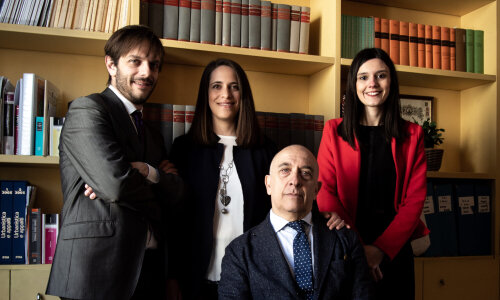Best Whistleblower & Qui Tam Lawyers in Modena
Share your needs with us, get contacted by law firms.
Free. Takes 2 min.
List of the best lawyers in Modena, Italy
About Whistleblower & Qui Tam Law in Modena, Italy
In Italy, including Modena, whistleblower law provides protection to individuals who report illegal or unethical conduct within organizations, especially in the public sector. Qui tam actions, where private citizens can bring legal proceedings on behalf of the state to expose fraud against governmental bodies, have parallels in Italian law but differ from the U.S. model. Italy’s legal landscape focuses on safeguarding those who denounce corruption, abuse of office, or breaches of duty, particularly following the introduction of Law 179/2017. This law outlines the protections and rights of whistleblowers in both public and private sectors, aiming to encourage transparency and integrity within organizations.
Why You May Need a Lawyer
Individuals may find themselves in situations where legal assistance is crucial for whistleblower and qui tam matters. Common scenarios include:
- Employees witnessing corruption, fraud, embezzlement, or other unlawful activities within their workplace and seeking guidance on how to report these safely.
- People worried about retaliation, such as wrongful dismissal or workplace harassment, after exposing wrongdoing.
- Those seeking clarification on their rights and obligations when handling confidential or sensitive information related to potential illegal acts.
- Individuals requiring representation in court or before administrative authorities if retaliation or legal disputes arise.
Local Laws Overview
Several key regulations are essential for anyone considering whistleblowing in Modena, Italy:
- Law 179/2017: Provides guidelines to protect both public and private employees who report illegal activities. It explicitly forbids retaliation or discrimination against whistleblowers and sets out confidentiality requirements for their identities.
- Decree 231/2001: Allows companies to implement compliance programs and internal reporting systems, further fostering a culture of transparency and reducing corporate liability.
- GDPR and Privacy Laws: Regulate the handling of personal data and information during whistleblowing processes, protecting both the whistleblower and those being reported.
Frequently Asked Questions
What is considered whistleblowing under Italian law?
Whistleblowing refers to the act of reporting illegal, unethical, or unsafe practices within an organization, especially those that could harm the public interest or violate laws and regulations.
Am I protected if I report misconduct anonymously?
Italian law encourages confidentiality, and organizations must protect the identity of whistleblowers. While anonymous reports are possible, they may be harder to investigate fully.
What protections do whistleblowers have against retaliation?
Law 179/2017 strictly prohibits retaliation, including dismissal, discrimination, or other adverse consequences, for those who report in good faith.
Who can I report to if I witness wrongdoing in my workplace?
You may report to your employer’s internal compliance body, the organization's designated whistleblowing channel, or external authorities like ANAC if internal channels are inadequate or compromised.
What kind of evidence should I gather before reporting?
It’s advisable to collect factual and documentary evidence supporting your claims, such as emails, documents, or witness statements, while avoiding illegal means of obtaining this evidence.
Will my report become public knowledge?
Your identity must be kept confidential throughout any investigative process. Disclosure is allowed only in rare cases required by law or for defense purposes.
Can private sector employees be protected as whistleblowers?
Yes, protections have extended to private sector employees when their reports concern conduct that violates laws or causes harm to public interest.
Can I face criminal charges for false reporting?
Yes. Whistleblowers are protected only when they act in good faith. False or malicious reports can lead to disciplinary actions or criminal prosecution.
What financial incentives exist for whistleblowers in Italy?
Unlike the United States, Italian law does not provide direct financial rewards for whistleblowers. The protection focuses on safeguarding against retaliation rather than monetary gain.
How can a lawyer assist me in the whistleblowing process?
A lawyer can explain your rights, help you evaluate the evidence, protect your identity, guide you through reporting to the appropriate authority, and defend you if you face retaliation.
Additional Resources
For individuals seeking further assistance or information regarding whistleblower and qui tam matters in Modena, the following resources may be helpful:
- Autorità Nazionale Anticorruzione (ANAC): Supervises anti-corruption measures, including the protection of whistleblowers.
- Modena Bar Association (Ordine degli Avvocati di Modena): Can help connect you with qualified lawyers experienced in whistleblower law.
- Labor Unions (Sindacati): Offer support and advocacy for workers facing retaliation.
- Internal Compliance Officers: Many organizations have designated individuals or bodies to handle whistleblowing reports safely and confidentially.
- Non-Governmental Organizations: Some NGOs provide guidance or support for whistleblowers.
Next Steps
If you believe you’ve witnessed wrongdoing that may require whistleblower protection or a qui tam-like action in Modena, consider these steps:
- Document all relevant details and evidence clearly while preserving confidentiality.
- Consult a lawyer specializing in employment, criminal, or administrative law to evaluate your case and ensure you’re fully aware of your rights and obligations.
- Identify the appropriate reporting channel-internal or external-and follow their procedures.
- Maintain records of all communications and actions taken related to your report.
- If you experience any form of retaliation, seek legal support immediately.
Lawzana helps you find the best lawyers and law firms in Modena through a curated and pre-screened list of qualified legal professionals. Our platform offers rankings and detailed profiles of attorneys and law firms, allowing you to compare based on practice areas, including Whistleblower & Qui Tam, experience, and client feedback.
Each profile includes a description of the firm's areas of practice, client reviews, team members and partners, year of establishment, spoken languages, office locations, contact information, social media presence, and any published articles or resources. Most firms on our platform speak English and are experienced in both local and international legal matters.
Get a quote from top-rated law firms in Modena, Italy — quickly, securely, and without unnecessary hassle.
Disclaimer:
The information provided on this page is for general informational purposes only and does not constitute legal advice. While we strive to ensure the accuracy and relevance of the content, legal information may change over time, and interpretations of the law can vary. You should always consult with a qualified legal professional for advice specific to your situation.
We disclaim all liability for actions taken or not taken based on the content of this page. If you believe any information is incorrect or outdated, please contact us, and we will review and update it where appropriate.









